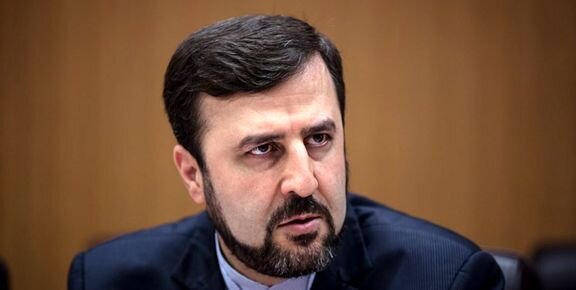Iran resisting ‘dangerous precedent’ in IAEA: diplomat

TEHRAN - Kazem Gharibabadi, Iran’s ambassador to the Vienna-based international organizations, told reporters on Tuesday that Iran is countering a “bad and dangerous precedent” in the IAEA which tries to “give credibility to fake reports by spy services” run by the U.S. and Israel.
“Unfortunately, once again the United States and the regime of Israel, by putting pressure on the Agency, are trying to undermine the relations and active and constructive cooperation between Iran and the Agency” in order to derail the UN body from its professional task, the Iranian diplomat said.
Gharibabadi made the remarks in reaction to a recent IAEA report concerning the safeguards issues in Iran.
Gharibabadi made it clear that any request from the IAEA for additional verification or access on the basis of fake reports of the spy agencies, including the Israeli spy services, not only will be in contradiction to the IAEA’s founding documents and to the verification system, but also do not commit Iran to agreeing to those requests, Tasnim reported.
“If countries do not take fundamental measures against these plots, their national sovereignty will be undermined,” he warned.
The International Atomic Energy Agency released two reports about Iran’s nuclear program on Tuesday. In one of the reports, the IAEA repeated the claim that it had identified three locations in Iran where the country possibly stored undeclared nuclear material or undertook nuclear-related activities without declaring it to international observers.
It said it had sent questions to Iran in three separate letters but received no answers.
“The agency identified a number of questions related to possible undeclared nuclear material and nuclear-related activities at three locations in Iran that had not been declared by Iran,” the agency said in the report.
Commenting on the claims, IAEA Director-General Rafael Grossi demanded Iran’s “clarifications” over the so-called undeclared sites.
Grossi told the AFP that “Iran must decide to cooperate in a clearer manner with the agency to give the necessary clarifications.”
“The fact that we found traces (of uranium) is very important. That means there is the possibility of nuclear activities and material that are not under international supervision and about which we know not the origin or the intent,” claimed the IAEA’s head.
The IAEA has not specified the origin of the allegation, but since April 2018, the U.S. and Israel have been busy making a fuss about unsubstantiated Tel Aviv-sourced allegations about undeclared nuclear activity by Tehran.
Iran has repeatedly warned the agency against attempts by the U.S. under President Donald Trump and Israel — a staunch opponent of diplomacy with Iran — to put pressure on the IAEA with the goal of killing the JCPOA.
MH/PA
